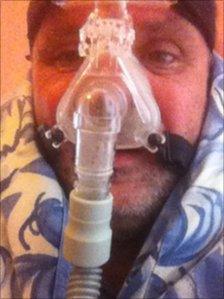Sleepy Ed's apnoea, and me and my 'snore machine'
- Published

Huw's snoring machine treats the symptoms of sleep apnoea
Labour leader Ed Miliband undergoes an operation to cure his sleep apnoea, but there are other treatments for people with less severe forms of the condition.
It was on a holiday in New York, when the man in the hotel room next door started banging on the wall complaining about my snoring, that I first suspected there might be a problem.
Later, back in Glasgow, students in the flat above mine complained about my snoring, when I went up to complain about their loud music and their habit of dragging furniture around all night.
So I went to see my GP. And he referred me to the sleep clinic at Gartnavel Hospital.
First step was an afternoon sleep in a darkened room at the hospital, with all kinds of monitors and probes attached.
They confirmed I had "mild to moderate" sleep apnoea.
It is a condition in which the airways close while you are sleeping.
You stop breathing, perhaps dozens of times every night.
After a few minutes the body gasps for air, producing a loud snort or snoring noise.
It means you never really go into deep sleep. And it can leave you tired, all the time.
Next, one night at home with a sophisticated pump blowing air at me through a mask covering my face.
The machine was constantly varying the pressure, to see which gave the best results.
That information was then programmed into my very own "snore machine".
It produces a steady stream of air that keeps the airways open - almost like a splint.
Afterwards, when I started telling friends and former flat-mates about my diagnosis, lots of people claimed they had tried to alert me to my problem snoring.
Of course, I never heard the noises that caused so much distress to everyone else.
But a series of tests and questionnaires seemed to confirm that before I had the snore machine I really was sleepy all the time.
That matters because apnoea patients may be much more likely to fall asleep at deeply inappropriate moments. Not least, behind the wheel of a car.
There's a possibility that, untreated, the condition may increase the risk of high blood pressure, heart attack, and stroke.
And, of course, it can be unbearable for partners ... or anyone else trying to sleep within hearing range.
The "snore machine" (or continuous positive airway pressure generator, to give it its proper name) is a treatment, not a cure.
But it seems to work for me.
Other people use jaw restraints, or devices that clip over the teeth, to hold the airways open.
- Published27 July 2011